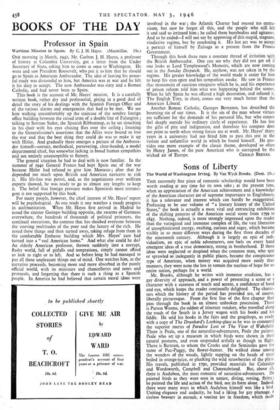BOOKS OF THE DAY
Professor in Spain
Wartime Mission in Spain. By C. J. H. Hayes. (Macmillan. 15s.)
ONE morning in March, 1942, Mr. Carlton J. H. Hayes, a professor of history at Columbia University, got a letter from the Under Secretary of State, asking him to come at once to Washington. He went and saw President Roosevelt, who put it to him that he should go to Spain as American Ambassador. The idea of leaving his peace- ful study was distasteful to him, but America was at war and he felt it his duty to accept. The new Ambassador was sixty and a Roman Catholic, and had never been to Spain.
This book is the account of Mr. Hayes' mission. It is a carefully written book, rather dry and professorial, giving in a good deal of detail the story of his dealings with the Spanish Foreign Office and Of the various alarms and emergencies that had to be met. We see him walking uncomfortably up the staircase of the sombre foreign office building between the raised arms of a double line of Falangists ; talking to Serrano Suner, the Spanish Ribbentrop, as he sat slouching in his chair with his eyes chasing flies over the ceiling ; listening to the Generalissimo's assertions that the Allies were bound to lose the war and that the best thing they could do was to make it up with Hitler. And gradually there emerges a picture of the Ambassa- dor himself—correct, methodical, persevering, clear-headed, a model departmental chief, but somewhat lacking in broad human sympathies and not entirely unsusceptible to flattery.
The general situation he had to deal with is now familiar. In the summer of 1940 General Franco had kept Spain out of the war because Hitler had refused to give him Morocco ; after that he depended too much upon British and American navicerts to risk it. His life-line was petrol, and, as the negotiations over wolfram exports showed, he was ready to go to almost any lengths to keep it. The belief that foreign pressure makes Spaniards more intransi- gent is not supported by this book.
For many people, however, the chief interest of Mr. Hayes' report will be psychological. As one reads it one watches a steady progress in acclimatisation. When Mr. Hayes first arrived in Madrid he noted the sinister Gestapo building opposite, the swarms of 'Germans everywhere, the hundreds of thousands of political prisoners, the continual executions, the contrast that has shocked everyone between the starving multitudes of the poor and the luxury of the rich. He noted these things and then turned away, taking refuge from them in the comfortable Embassy building which Mrs. Hayes' care had turned into a " real American home." And what else could he do? An elderly American professor, thrown suddenly into a corrupt, flashy world, full of pitfalls and temptations, simply cannot afford to look to right or to left. And so before long he had managed to put all these unpleasant things out of mind. One watches him, as the narrative proceeds, becoming more and more absorbed in the purely official world, with its ministers and chancelleries and notes and protocols, and forgetting that there is such a thing as a Spanish people. In America he had believed that certain moral ideas were involved in the war ; the Atlantic Charter had roused his enthu- siasm, but now he forgot all this, and the people who still felt it and said so irritated him ; he called them busybodies and agitators. And so he ended—I will not say by approving of this stupid, stagnant; vindictive regime, but by condoning it. His last act was to accept a portrait of himself by Zuloaga as a present- from the Franco Government.
Through this book there runs a constant thread of irritation with the British Ambassador. One can see why they did not get on if one looks at Lord Templewood's Memoirs, which are now coming out in the Sunday Dispatch. He, anyhow, was not taken in by the regime. His greater knowledge of the world made it easier for him to keep his eyes open and his sympathies awake. He saw in Franco that monument of cautious smugness which he is, and his experience of prison reform told him what was happening behind the scenes. When he left Spain he was offered a high decoration, and refused it. The English Tory, in short, comes out very much better than the American Liberal.
Another Roman Catholic, Georges Bernanos, has described the besetting sin of our times. It is the sin of the man whose virtues are sufficient for the demands of his personal life, but who cannot feel deeply outside his ordinary circle of experience. He has lost the gifts of pity and indignation, and therefore his compass does not point to north when strong forces are at work. Mr. Hayes' thirty years in a university had not fitted him to pass this test in the violent and unfamiliar world in which he found himself. 1-fe pro- vides one more example of the classic theme, developed so often by Henry James, of the pure American who is corrupted by the






























 Previous page
Previous page